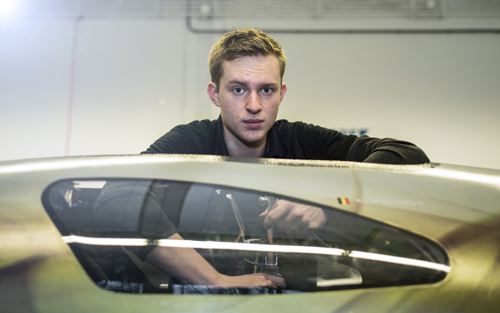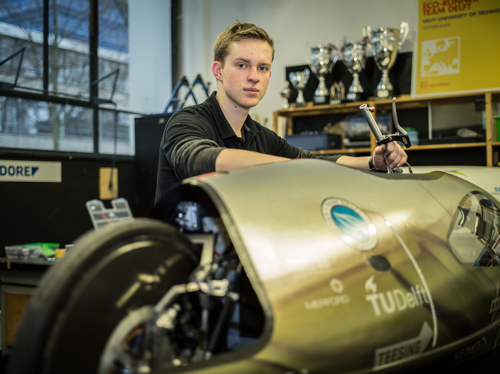Rafael
Dreamteam: Eco-Runner

Name: Rafael
Rafael studied Applied Earth Sciences, now known as Earth, Climate and Technology
Eco-Runner Team Delft
Every year the Eco-Runner team thrives to design and build the most fuel-efficient vehicle in the world. They succeeded in 2015 when they took home the first prize after winning the yearly held Shell Eco-marathon. In 2016 Rafael, a 21-year old Applied Earth Sciences (now known as Earth, Climate and Technology) BSc student, decided to join this team consisting of 31 students and he has already dedicated a big amount of time and knowledge to the team.

How did you end up at Dream Team Eco Runner?
Rafael has always had a general interest in cars, so when he saw the Eco-Runner team standing in front of the library for their promotion, it sparked this particular interest. Out of curiosity he started asking some questions. “They mentioned they needed a guy that was handy with the tools and that is how I got in.”
What is your role in the team?
The team is divided into several departments. One of the departments is vehicle dynamics, which consists of the front suspension, the rear suspension, the steering, the brakes and the tires. And Rafael is in charge of the steering system. “My job is to try and find the most fuel efficient way to make the car steer so that we encounter the least amount of drag when cornering.”
However, there is more to be dealt with. The steering system also has to comply with the Shell eco marathon rules, for instance, no play is allowed in the system, it has to be safe, and a dead man’s switch needs to be present. Thus, it is also his job to make sure all these rules are implemented in the steering system and that the system actually works, while being fuel-efficient.
In what way does your bachelor benefit the team?
According to Rafael, the bachelor itself does not especially contribute to building the most fuel-efficient vehicle. He does feel, however, that the bachelor gives him a good basis. The programme consists of classes in for example mechanics, calculus and chemistry, which gives him a basic understanding of how things work scientifically and from there on he can go further. “For other topics I need to do research on the Internet and ask my teammates for help, of course.”
What are your future plans?
“I am very into logistics and mobility. I like the idea of transportation and I genuinely love the idea of hydrogen cars. I think it is amazing that from hydrogen you can produce electricity, so I am contemplating doing something in that direction. However, I do not have concrete plans yet.” He enjoys what he is doing today: mending stuff and fiddling around with different settings to see what works. For now, he thinks he is actually pretty good at what he does. “We will see where the coming years will take me.”